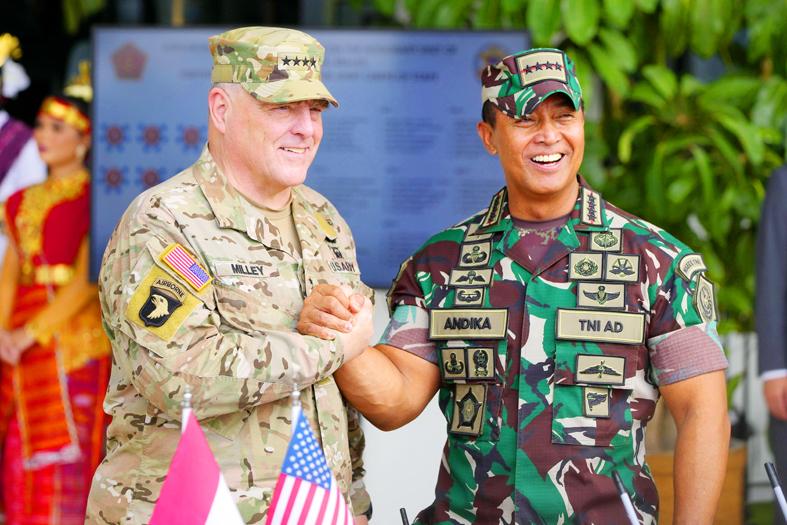The Chinese military has become considerably more aggressive and dangerous over the past five years, the most senior US military officer said during a trip to the Indo-Pacific region that included a stop in Indonesia yesterday.
General Mark Milley, chairman of the US Joint Chiefs of Staff, said the number of intercepts by Chinese aircraft and ships in the Pacific region with US and other partner forces has increased significantly over that time, and the number of unsafe interactions has risen by similar proportions.
“The message is the Chinese military, in the air and at sea, have become significantly more and noticeably more aggressive in this particular region,” said Milley, who recently asked his staff to compile details about interactions between China and the US and others in the region.

Photo: AP
His comments came as the US redoubles its efforts to bolster its relationships with Pacific nations as a counterbalance to China, which is trying to expand its presence and influence in the region. US President Joe Biden’s administration considers China its “pacing threat” and the US’ primary long-term security challenge.
Milley’s trip to the region is sharply focused on the China threat. He is to attend a meeting of Indo-Pacific chiefs of defense this week in Sydney, Australia, where key topics would be China’s escalating military growth and the need to maintain a free, open and peaceful Pacific.
US military officials have also raised alarms about the possibility that China could invade Taiwan. China has stepped up its military provocations against Taiwan as it looks to intimidate it into unifying with the communist nation.
China’s top military officer, General Li Zuocheng (李作成), told Milley in a July 7 call that Beijing had “no room for compromise” on issues such as Taiwan.
He said he told Milley that the US must “cease US-Taiwan military collusion and avoid impacting China-US ties and stability in the Taiwan Strait.”
The US and others are also worried that a security agreement that Beijing signed in April with the Solomon Islands could lead to the establishment of a Chinese naval base in the South Pacific.
“This is an area in which China is trying to do outreach for their own purposes, and again, this is concerning because China is not doing it just for benign reasons,” Milley told reporters traveling with him. “They’re trying to expand their influence throughout the region, and that has potential consequences that are not necessarily favorable to our allies and partners in the region.”
Milley declined to provide specific numbers of unsafe Chinese interactions with US and allied aircraft and ships.
Milley said there have been Chinese intercepts with Australia, Canada, Japan, the Philippines and Vietnam.
They all have seen a “statistically significant” increase in intercepts, and the number of unsafe incidents has increased by an “equal proportion,” he said.
Milley, who met with General Andika Perkasa, commander of the Indonesian National Armed Forces, said Pacific nations like Indonesia want the US military involved and engaged in the region.
“We want to work with them to develop interoperability and modernize our militaries collectively” to ensure they can “meet whatever challenge that China poses,” Milley said.

‘ABUSE OF POWER’: Lee Chun-yi allegedly used a Control Yuan vehicle to transport his dog to a pet grooming salon and take his wife to restaurants, media reports said Control Yuan Secretary-General Lee Chun-yi (李俊俋) resigned on Sunday night, admitting that he had misused a government vehicle, as reported by the media. Control Yuan Vice President Lee Hung-chun (李鴻鈞) yesterday apologized to the public over the issue. The watchdog body would follow up on similar accusations made by the Chinese Nationalist Party (KMT) and would investigate the alleged misuse of government vehicles by three other Control Yuan members: Su Li-chiung (蘇麗瓊), Lin Yu-jung (林郁容) and Wang Jung-chang (王榮璋), Lee Hung-chun said. Lee Chun-yi in a statement apologized for using a Control Yuan vehicle to transport his dog to a

Taiwan yesterday denied Chinese allegations that its military was behind a cyberattack on a technology company in Guangzhou, after city authorities issued warrants for 20 suspects. The Guangzhou Municipal Public Security Bureau earlier yesterday issued warrants for 20 people it identified as members of the Information, Communications and Electronic Force Command (ICEFCOM). The bureau alleged they were behind a May 20 cyberattack targeting the backend system of a self-service facility at the company. “ICEFCOM, under Taiwan’s ruling Democratic Progressive Party, directed the illegal attack,” the warrant says. The bureau placed a bounty of 10,000 yuan (US$1,392) on each of the 20 people named in

INDO-PACIFIC REGION: Royal Navy ships exercise the right of freedom of navigation, including in the Taiwan Strait and South China Sea, the UK’s Tony Radakin told a summit Freedom of navigation in the Indo-Pacific region is as important as it is in the English Channel, British Chief of the Defence Staff Admiral Tony Radakin said at a summit in Singapore on Saturday. The remark came as the British Royal Navy’s flagship aircraft carrier, the HMS Prince of Wales, is on an eight-month deployment to the Indo-Pacific region as head of an international carrier strike group. “Upholding the UN Convention on the Law of the Sea, and with it, the principles of the freedom of navigation, in this part of the world matters to us just as it matters in the

The High Court yesterday found a New Taipei City woman guilty of charges related to helping Beijing secure surrender agreements from military service members. Lee Huei-hsin (李慧馨) was sentenced to six years and eight months in prison for breaching the National Security Act (國家安全法), making illegal compacts with government employees and bribery, the court said. The verdict is final. Lee, the manager of a temple in the city’s Lujhou District (蘆洲), was accused of arranging for eight service members to make surrender pledges to the Chinese People’s Liberation Army in exchange for money, the court said. The pledges, which required them to provide identification